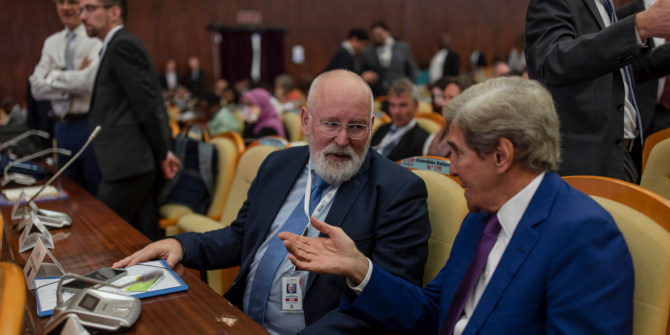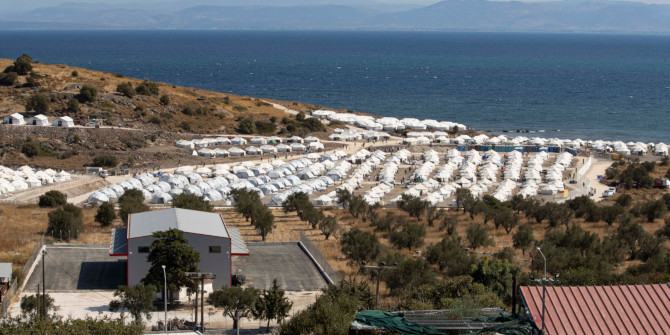 The remaining 27 EU member state governments met in Bratislava on 16 September for their first major meeting without the UK since the Brexit referendum in June. As Solon Ardittis writes, one of the main developments to emerge from the meeting was an apparent shift in the EU’s approach to the migration crisis, with so called ‘flexible solidarity’ being presented by some member states as an alternative model to the mandatory refugee relocation scheme which has been implemented for the past two years. Drawing on the lessons that have been learned from the crisis until this point, he outlines how this model could be made to work in practice.
The remaining 27 EU member state governments met in Bratislava on 16 September for their first major meeting without the UK since the Brexit referendum in June. As Solon Ardittis writes, one of the main developments to emerge from the meeting was an apparent shift in the EU’s approach to the migration crisis, with so called ‘flexible solidarity’ being presented by some member states as an alternative model to the mandatory refugee relocation scheme which has been implemented for the past two years. Drawing on the lessons that have been learned from the crisis until this point, he outlines how this model could be made to work in practice.

At the informal meeting of the 27 heads of state or government in Bratislava, the four Visegrad countries issued what was labelled as an important joint statement outlining their common position on EU migration policy. The joint statement underlined, in particular, that migration policy should be based on the principle of “flexible solidarity” and that this concept should enable member states to decide on specific forms of contribution taking into account their experience and potential. It further stressed that any refugee distribution mechanism should be voluntary.
At the same meeting, Chancellor Merkel recognised for the first time in public that the relocation plan had so far encountered some ‘serious obstacles’ and that the time had come to ‘envision new approaches’. This view was also echoed by President Schulz who admitted that the mandatory refugee relocation system had failed.
Despite a non-binding resolution issued by the European Parliament on 16 September calling on the member states to honour their pledges to accept refugees from Greece and Italy, the EU’s relocation plan might now be in its final days. And based on the achievements of the plan to date, it is likely that few member states will mourn its death. As of 15 September, only 4,890 people out of the planned 160,000 had been relocated from Greece and Italy under the EU mandatory quota system.
So, ahead of the special meeting on migration to be held on 24 September with the heads of some the member states that are most affected by the on-going migration crisis, it is worth asking what ‘flexible and voluntary solidarity’ might entail. As an initial point it should be stated that converting the mandatory nature of the current relocation system into a voluntary one is unlikely to make a dent in the level of pledges experienced to date.
This would imply that ‘solidarity’ and ‘responsibility sharing’ are innate concepts, rather than imposed ones, in the national refugee policies of the member states, when they are clearly not in most cases. Therefore, the only way a relocation policy could gain traction in the EU would be by recasting its governance and decision-making model and by acknowledging that central governments can no longer be left to decide alone on the principles and practicalities of responsibility sharing in the field of refugee policy.
Based on this premise, the first proposal would therefore be to establish, in each member state, a national multi-stakeholder resettlement task force that would bring together representatives from central government, local authorities, the private sector, employers and civil society, and that would meet regularly to decide on the numbers and profiles of refugees to be resettled in the country, and the cities and towns that would welcome them.
Through such a composite task force, central authorities, which would of course retain final decision making prerogatives, would major on issues of security and financial implications falling under the national budget; local authorities would advise on such issues as the effect on the education system and housing capacity in particular cities and towns; and the private sector would report on specific labour shortages and employment opportunities at the local level.
This model would have the potential to lessen some of the restraints in the implementation of the EU relocation policy to date, including the dissension that has often been observed between the pledging decisions made by the central authorities and the more open-handed position adopted by local authorities and civil society in a number of member states. While it is difficult to predict the extent to which this new model might increase in any way the number of pledges made in each member state, it would at least offer a more honest picture of the real capacities and disposition of all national and local actors concerned.
Secondly, the Visegrad joint statement suggests that member states should be able to contribute to refugee relocation policy in various forms, based on their experience and potential. Presumably, this would also include financial contributions. Based on this assumption, the second proposal for a reformed EU relocation system would consist of establishing a special refugee solidarity fund that would aim to support exclusively emergency measures in Greece and Italy (and possibly Bulgaria, Malta and Spain), as well as reception and integration programmes implemented in those member states that have accepted to relocate refugees.
This would enable member states that do not receive refugees to contribute directly to the burden carried by those that do and therefore to express their ‘flexible’ and ‘voluntary’ solidarity to the on-going EU refugee crisis. The fund would allow for payments to have all the necessary visibility and therefore for the exact levels of contribution from each member state to be publicly known. Non-state actors would also of course be able to contribute to the fund directly, thus centralising and channelling the surge of generosity towards the migrant crisis that has been witnessed from a number of citizens and private and civil society organisations over the past couple of years.
The proposed fund could also be inspired by the recent initiative by President Obama to establish a ‘Partnership for Refugees’ involving the private sector and enabling major corporations such as Accenture, Airbnb, Goldman Sachs, Google, HP, IBM and JPMorgan to build on existing efforts by governments, NGOs, and UN agencies on the refugee crisis though their unique capabilities and resources.
The third way in which ‘flexible’ and ‘voluntary’ solidarity could be brought into play would be through in-kind and technical contributions. Member states not receiving refugees under the relocation plan would be invited to offer, voluntarily and in line with their capacity and areas of specialisation, technical assistance, equipment and short-term national specialised staff to assist in the emergency response and the reception efforts deployed on the Greek islands and in Italy. A central roster of priority needs for short-term expertise in Greece and Italy would be established to this effect and pledges made by each member state would again be recorded publicly.
Other examples of in-kind contributions from member states not accepting refugees through the relocation plan would include increased inputs to Frontex and NATO military operations at the EU’s external borders, as well as to the new European External Investment Fund which aims to address the root causes of migration and to promote sustainable investments in neighbouring states and in Africa by raising as much as €60bn in funding.
While the existing EU relocation scheme has had the merit of offering a straightforward and fair system drawing on a distribution key that was based on objective, quantifiable and verifiable criteria, one of its major disadvantages to date has of course been its dismissal, in practice, by an overwhelming majority of member states. While the system now appears to have lost its final vote of confidence, it is likely that the future of intra-EU solidarity in the field of migration and refugee affairs will draw on a more fragmented, unpredictable and bottom up set of principles and modus operandi.
It will also rely on a wider range of voluntary actors from the public and private sectors, and from civil society. The end-result, in terms of the number of refugees relocated and other effects on the on-going crisis, might or might not exceed the limited achievements of the existing relocation system to date. However, it is likely to overcome the current predicament facing EU migration solidarity policy, establish potentially innovative pathways to sharing responsibility for the crisis and perhaps even weaken the populist narrative ahead of a number of major elections in Europe over the next 12 months.
Please read our comments policy before commenting.
Note: This article gives the views of the author, and not the position of EUROPP – European Politics and Policy, nor of the London School of Economics. Featured image: EU 27 summit in Bratislava on 16 September 2016, via m.smedata.sk.
Shortened URL for this post: http://bit.ly/2cCR3Yo
_________________________________
 Solon Ardittis is Managing Director of Eurasylum and a Research Fellow at the Institute for the Study of Labor (IZA). He is also co-editor of ‘Migration Policy Practice’, a bimonthly journal published jointly with the International Organization for Migration (IOM).
Solon Ardittis is Managing Director of Eurasylum and a Research Fellow at the Institute for the Study of Labor (IZA). He is also co-editor of ‘Migration Policy Practice’, a bimonthly journal published jointly with the International Organization for Migration (IOM).






The EU policy on the dispersal of migrants has failed, not because of any change in its dictatorial approach, but because certain brave countries flatly refused to have any migrant quotas imposed on them.
Meanwhile, financially strapped Greece is stuck holding the stick for the magnet countries like Germany inviting them to fill its aging population and labor shortage.